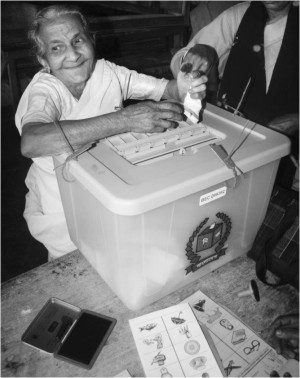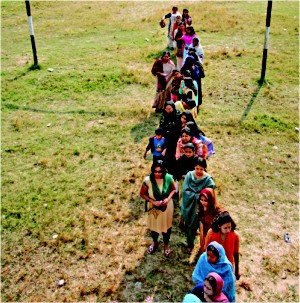
Local governance: An agenda so far ignored
Dr.Tofail Ahmed
 |
Photo: Star |
LOCAL Governance and Government is an agenda created enough of heat and light for last one and a half decadeswith the critical political massbut proved less than adequate to awake, warm and enlighten the central political and administrative elitesof the country. The more civil society, intelligentsia, political oppositions and popular press attached importance, the more the established political elites were getting scared. The top brass party leaders in private even occasionally to the press andin different public forums support the position the general citizen are taking on the issue of Local government. In spite of all these hue and cries, the Members of Parliament (MPs) across the party (position and Opposition both) remained unmoved. The Municipal elections are held after an extended period of two and a half years. Dhaka City Corporation election is still uncertain and Union Parishad (UP)elections are promised to be held in March-May 2011, though almost three overdue years already elapsed. Holding overdue elections depends entirely on the political convenience of the ruling party which is quite contrary to the constitutional sprit and direction.
LG Election: hot political agenda without content
The government and the main opposition both accept Local Government Institution (LGIs) as a happy hunting ground for political muscle flexing. Lastly with the announcement of 'party supported candidacy' in the municipal election 2011, non-party local election has been tried to turn into an instrument in party building process. This is very unfortunate for an infant democracy that our politicians donot differentiate between party and government. We very often portray ourselves as ardent advocates of the 'separation of power'. By separation we correctly mean separation of power amongst the three organs of Government. But benignly ignore the separation of party and government especially by the ruling parties. When parties win elections and power, they almost abandon party and at one stage party and government is combined. The parties adopt policies and programs during the election campaigns to earn citizen support, after election no evaluation on thestatus party policy implementation is done. Whatever governments do, undo and expresses (even through body languages), become the party policy. Parties are totally absorbed in governments.
Since the 9th parliamentary election, no party irrespective of ruling and opposition ever revisited any of their policythat they placed before the nation during the election. The ruling AL and Grand Alliance in their election manifesto promised to establish effective and strong local governance system in the country. The reality is, they are systematically destroying the potentials of institutionalizing grassroots democracy and people-driven local development. In stead, politicisation and encadrerment has become rampant in running field administration and delivery of various local development funds and services. The oppositions too are lunching movements and organizing agitations without major policy contents.
Last municipal election has been taken as a yardstick for assessing ruling alliance's support barometer in its third year of the five year term. The trend emerged out of the election result was not encouraging for the ruling party. On the other hand, opposition was enthused and energized greatly by the result. Perhaps, it was unexpected result to them. The media and political analysts of the country spent hundreds of hours in analyzing the implications as it was considered as 'mid-term' opinion poll. It was very surprising that neither the ruling party nor the opposition after election said a word, what they are going to do with local government in the coming days. The opposition even after their “unexpected victory” did not issue any statement regarding their policy on LGI.Because past policy record of BNP in support of LGI was ambiguous. It seems all our democratic rhetoric start and end in election. Elections local or national are fought on empty issues and end in the fiasco of victory or defeat. The serious 'Local Governance' issue is still on the table and largely remainedunattended.
 |
Photo: Amirul Rajiv |
Policy issues for serious attention
The issue of local governance and local government is not a simple issue to be addressed with some additional financial allocation, developing few more new projects and issuance of another circular from the concern ministry. This is a serious constitutional issue, all the subsequent governments ignoring for decades. On the other hand, it is of course a serious issue deserve to be considered for institutionalizing democracy ,equitable distribution of resources and delivery of services to the citizen in a just and equitable manner. Democracy in a republic cannot bemade functional only by an all powerful single chamber parliament. Similarly good governance cannot be initiated only by council of ministers and few secretariat officials. Democracy, democratic ideals and governance are sustained only with credible institutions; and local government institutions (LGIs) are one the very important set of institutions which upholds democracy from the very root of the society and also share many of the burden of central government's management responsibilities to give enough of space to the national government to address more important strategic issues.
The LGIs help flourish the democratic political and responsive governance culture from the very foundation of the society. With the increase of the size of the national budget, the government expenditure at Upazila (UZP) and UP levels also increased many folds compared to the pre 2010 scenario. The million dollar question remain unanswered is, how the resources are utilized, who benefits and how? For example, take the cases of 'safety net' programs; as many as ten central government departments are assigned to deliver the safety net programs. Each follows its own rule. There is none to coordinate, integrate, and monitor the effective implementation at the beneficiary levels. The delivery of safety net program is basically the responsibility of the few centrally organized bureaucratic departments. Legally mandated people's institutions like Ups, UZPs and Municipalities are just subordinate facilitating partners. Each and every program has its own committee at District, Upazila and Union levels by order of the respective ministries or directorates. In one of our assessments, we found 40-65 such committees in each Upazila, none of them in fact effective and functional.
The food assisted development and food assisted safety net programs are more chaotic. The programs like General Relief (GR), Test Relief(TR), Food for Works ( FFW), 100 Days work, etc. are directly managed by local political bosses. Hundreds of schemes are prepared and implemented (some arefinished within range of 25-30 days) without any administrative and technical supervision. The food assistance during normal time and in relatively stable areas needs tobe utilized differently than the emergency disaster operations. All the resources under safety net and food assistance should be brought under the planned activities of the UPs, UZPs and municipalities. Contingency allocations for hurriedly prepared schemes have to be stopped altogether and all these allocations should be brought under local level plan.
Under the UP Act 2009 and UZP Act, 1998 as amended in 2009, the services of 13 ministries at Upazila and 7 ministries at union are transferred to the respective LGIs.The 9th Parliament passed the law and Ministry of Local Government and later Cabinet Division issued orders to make the law effective. The law and the circulars in respect of transfer have been totally ignored at all levels. There are lobbies in the ministries to withdraw some of the departments. An amendment to the UZPlaw is already mooted to pull UNOs out of theLGI net. The buildings are complete in almost 3000 UPs of the country with adequate accommodations for all local level government functionaries. None except few SAAEOs stared using the facility. There are wide spread ignorance, indifference, arrogance and non-compliance at all level of administration and at the base level, it is more than serious.
An all encompassing environment of over-centralization has engulfed the whole country. A new generation movement towards decentralization has become the crying need of the hour. This decentralization is not limited to devolution only; just transfer of power and authority to LGIs. It should start from decentralization of politics and political party structure to deconcentration of power and authority to the field level administration. Delegation of authority to the specialized agencies on specialized and technical matters from general bureaucracy and lastly the decentralization of economic activities to specific areas and zones should also be part of a reform agenda. A great shift from 'Capital City centric' administration, decision making and development need serious consideration. Capital City is suffering from heavy 'development congestion', intellectual 'thought block' and 'power constipation'. To ease these congestion and constipation a large number of sensible citizen of the country are advocating for a 'National Decentralization Policy and Decentralization Commission'. The role and responsibility of national and local governments, bureaucracy and public representatives, ministry, directorate and specialized agencies, head quarter and field offices need to spelled out with a clear sense of direction. A well thought out 'Decentralization policy' and subsequent reformulation of an umbrella law in this direction may help to put the country on the right track to move forward. The reform agenda nation has been pursuing for nearly a decade for the time being took a back seat. The reform issues need tobe brought to the fore again and “Decentralization” should be considered as a serious reform agenda for changing the course of our political and development history, if not more for next three decades.
Professor Tofail Ahmed, former Member of Local Government Commission and an author of number of books on Decentralization and Local government.